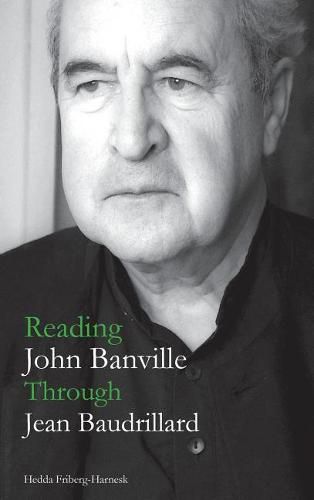Reading John Banville Through Jean Baudrillard
Hedda Friberg-Harnesk

Reading John Banville Through Jean Baudrillard
Hedda Friberg-Harnesk
This title is printed to order. This book may have been self-published. If so, we cannot guarantee the quality of the content. In the main most books will have gone through the editing process however some may not. We therefore suggest that you be aware of this before ordering this book. If in doubt check either the author or publisher’s details as we are unable to accept any returns unless they are faulty. Please contact us if you have any questions.
John Banville is one of Ireland’s greatest contemporary prose writers, widely known as the master of simile and metaphor. An artful explorer of the murky waters of memory, he is a relentless prober of the uncertainty of the human condition. In addition to a number of plays, and innumerable magazine and newspaper articles, Banville’s sixteen novels have been enthusiastically received. In 2005, The Sea won the Man Booker Prize. Banville then went on to win the Franz Kafka Prize in 2011, the Irish PEN Award for Outstanding Achievement in Irish Literature in 2013, and the Prince of Asturias Award, the sought-after Spanish literary prize, in 2014. There has been talk too about Banville being a possible candidate for the Nobel Prize in literature.
This study is the first to apply aspects of Jean Baudrillard’s thinking on simulation to John Banville’s work by tracing and analyzing instances of simulation in seven novels and two plays, which were published in 1997-2015, by Banville. The analysis sheds light on issues of duplicity, usurped identities, masks and masking, and the instability of self and reality. It shows how Banville’s work is in dialogue with the Baudrillard’s idea that simulation is an important mode of perception. There is a network of multiple and mutating connections which extend backward into the far reaches of past mythologies and forward into such realms of postmodernity as Baudrillard envisions in his descriptions of the third order of simulacra. Close readings of these texts by Banville reveal the presence of Baudrillard’s ideas incorporated in them. These include a tendency for things to float, copies to replace originals, connections to the real to be distorted or absent, and–in at least one novel–the entire human world to be an artful copy of a lost or nonextant original. As for the self, Baudrillard seems to envision the self as a wholly operational molecule, spinning within an uninterrupted circuit without reference or circumference. Banville’s narrating central characters, although tending to search for a unified self, are instead likely to find a vacancy at their core. Self emerges as an ignis fatuus–a ghost light fanning its own illusions of self-determination. A sense of vertiginous proximity to an existential void is a compelling presence in Banville’s texts and suggests that at their center, too, lies a vacancy, a void. This study also finds that in Banville’s work, creative acts of transformation and renewal provide a means–however fleeting–for resisting and managing that void. By reading Banville through Baudrillard, we gain important insights into Banville’s view of the human condition.
Reading John Banville Through Jean Baudrillard is an important resource for scholars, teachers, and students in the fields of contemporary literature and Irish studies.
This item is not currently in-stock. It can be ordered online and is expected to ship in 7-14 days
Our stock data is updated periodically, and availability may change throughout the day for in-demand items. Please call the relevant shop for the most current stock information. Prices are subject to change without notice.
Sign in or become a Readings Member to add this title to a wishlist.


